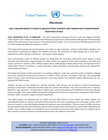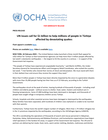Click to expand Image
Eleven men accused of responsibility for the 2009 massacre and mass rape of pro-democracy protesters by forces linked to a former military junta, stand during their trial in Conakry, Guinea, September 28, 2022.
© 2022 Souleymane Camara/Reuters
This week, the first major phase of the landmark domestic trial of crimes committed during Guinea’s 2009 stadium massacre concluded.
The trial – taking place before a three-judge panel in the capital, Conakry – examines one of the most brutal incidents in Guinea’s history. On September 28, 2009, Guinean security forces opened fire on peaceful demonstrators during a pro-democracy rally, leaving more than 150 dead. Security forces raped and gang raped more than 100 women, some pulled from hiding places. Human Rights Watch investigations found that security forces engaged in a coverup of the crimes, sealing off entrances to the stadium and morgues and moving bodies to mass graves.
The long-delayed trial commenced on September 28, 2022, the 13th anniversary of the massacre, with 11 accused – among them former ministers and a former president – entering the court and pleading not guilty. Victims and their families present at the hearing looked on from the gallery while others closely followed the proceedings on television.
Since then, the court has generally held three sessions a week. As can be common in countries with a civil law legal system, the first phase involved the judges and parties questioning each accused. Some accused placed blame on the others, while several explained that they were not present or lacked relevant authority when the crimes were committed.
During the next phase of the trial, which began on February 14, victims have an opportunity to be heard. Hundreds of victims have joined the case as civil parties, a feature of civil law systems that allows victims through their lawyers to examine the case file, question witnesses, and make arguments before the judges.
The trial is broadcast live on Guinean television daily and is available on YouTube. The proceedings are widely watched and discussed, and one diplomat has described the trial as “riveting the nation”. One need only see the stream of comments posted as the YouTube broadcasts play to see the attention the trial has attracted.
The trial is important not only for Guinea, but for other countries that may consider bringing atrocity crimes to court. In Guinea and beyond, victims and rights activists are looking on, hoping that justice will be credibly delivered in this rare kind of domestic trial.




